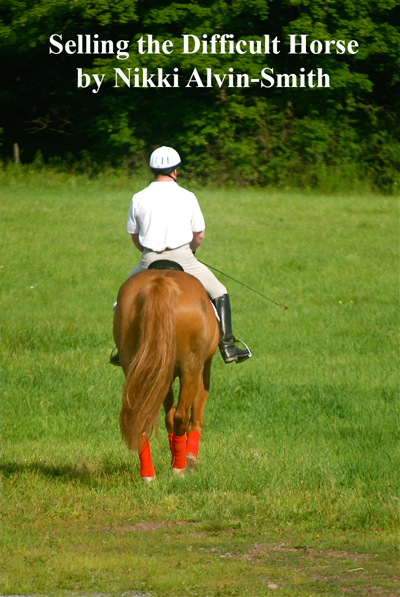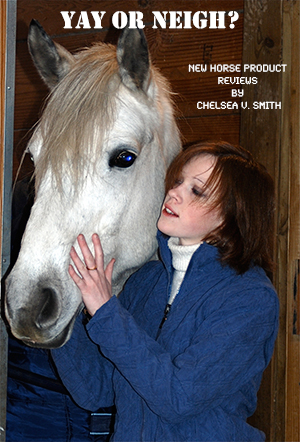Selling the Difficult Horse
by Nikki Alvin-Smith

With the horse market still incredibly soft it is not easy to sell any horse, let alone one that presents challenges for the rider. As a seller you want to experience the joy of seeing your equine partner trot off with the best rider match possible, and advertising your horse accurately is the key to being successful.
There is no perfect horse after all. And for every horse there is a rider and for every rider a horse. Experience has taught me that this is true. So how do you go about finding that great fit i.e. a rider that will enjoy your horse, handle his 'problems,' overcome the obstacles that you may see coming in his performance career and hopefully attain the maximum potential for both horse and rider in a happy manner. I have learned that I am not always the best rider for a particular horse, however accomplished I may believe my show record or experience indicates me to be. Horses 'gel' with different people in different ways.
I once had an off the track Thoroughbred mare that I had brought as a project because I felt sorry for her. She was chestnut, small. a good frame but had stood lonely in a field in harsh winter weather and was underweight and had significant rain rot. She was also a nervous type. I named her Grace.
For several months I worked on her. I dutifully groomed her through to the Spring and recovered her weight. I taught her to allow me to handle her hind legs without cow kicking, to enjoy the grooming process and to enjoy the time spent together. I worked her over ground rails, taught her to longe and gave her some basic dressage training. She gained weight and by the middle of summer she was blossoming into a lovely horse.
When I put her on the market I had lots of interest. Grace was not expensive, she had developed a beautiful topline and moved straight and true and she could now 'do stuff.' A parade of interested buyers came to visit. Naturally everyone wanted to ride her and under my watchful eye I allowed them to do so. When a rider became out of balance she became extremely nervous, with another rider she balked at the fences, with another rider she bucked and bolted about the ring not understanding their push and pull aids. I had to take her off the market and my goal was to work her some more and try again. I had to undo the worries that these prospective buyers had caused and build her confidence back up. A month or two later I tried again.
I told the folks that called the experiences we had with the mare before and when it was clear to me they were not educated or experienced enough riders I told them I would not show them the horse as I didn't believe it was a good fit. Then came a call from a local gal that had just lost her own horse. When she told me she was not the boldest of riders but had an independent seat and sensitive hands I booked her to come look at Grace.
I showed the horse under saddle, jumped a few rails and then I looked back at the gal. She was agog. She mounted the mare quietly and within two seconds Grace had let out a sigh and walked off like a pro with a big relaxed tiger walk, the sort us dressage riders love. The gal rode the mare for nearly an hour. Everything they did together was magic. I had to urge the gal to dismount because clearly the mare was getting tired even if the rider was not. We cooled out the horse together, chatted a bit and then headed back to the driveway and to the car.
I was disappointed. I thought for sure this gal would buy the horse but she hadn't said anything. So as she opened the car door I asked her, " Let me know if you want to come try her again." Her jaw dropped.
" Oh my God I'm buying her. I'll call my vet to come over as soon as possible. "
She suddenly realized in her complete excitement over Grace she had actually forgotten to say anything about the purchase. The vet came later in the week and the pre-purchase went smoothly, the trailer came the very next day and off Grace went. Many, many years later I received a call from the gal. While I had heard on the grapevine that Grace was successfully competing in the hunter ring, I had not heard much else for years.
The gal said she wanted to thank me for the horse of a lifetime and sadly explained that Grace had just died. She said the horse had been wonderful in the ring for many years and then came down with Potomac fever, which after much medication and effort she pulled through though it was touch and go for a bit. Then the gal had a new job and moved to California. Although the horse was older and the gal was worried about the long journey, she just couldn't part with Grace so she shipped her out West. Grace continued as her trail mount well into the horse's early 20's. By the end of the story of course we were both crying. She couldn't stop thanking me. I told her I was sure it was her intense relationship with Grace that had pulled her through the illness. I reflected that In someone else's hands that mare may have had a very different life and perhaps not such a happy one.
I have many similar stories like this one and I have always followed this edict when marketing a horse. I have never had a regret. And if you have made the tough decision to part with a horse, perhaps because you are tired of dealing with the antics or putting money into training the horse, or maybe you just want to move on, you must have confidence that you will find the good match if you search for it and are honest about the horse.
Your best option is to find someone that already knows your horse and his particular quirks and is prepared to work with them. It is also imperative that you price your horse realistically, because if he is not the best behaved he is simply not worth as much as a horse that is easy to ride and work around. The exception would be a horse of major talent, where professional riders might overlook a horse that kicks in his stall, rears, bucks, or has other bad habits.
The start is how you advertise your horse. Obviously you can state not for a beginner, needs advanced rider or words to that effect. But frankly this is negative advertising and so not the best solution. A better option is to say, " Best suited to an advanced rider" or "Best suited to an adult rider." You can lie and/or say nothing of his issues, and let the rider find out. You can even give your a horse a drug cocktail on the visits the rider makes to try him, to improve his 'attitude' by dulling him down. Who knows perhaps the rider won't notice. Perhaps their vet won't pull blood on the horse for possible later testing before the pre-purchase exam because the prospective owner is not wise enough to do that. Some folks don't even do a pre-purchase exam. Yikes!
Not being forthright and honest about the horse can be more than illegal, it can be downright dangerous. So what do you do?
When you advertise your horse be sure to show him doing whatever the job is that he is best at performance wise and make sure your horse is clean, well groomed and turned out and that you as the rider are also tidy. In your advertisement aside from the obvious size, breed, age and price etc. ( and I won't go into not lying here because it is a pretty stupid thing to fabricate and just wastes both your time and the prospective buyer's time if you do, they will find out), quote his strengths i.e. we all know athletic can mean "jumps out of his skin at every opportunity." Focus less on adjectives and more on accomplishments. A pretty head will sell a horse the quickest of all, but many experienced riders know that what is inside the head is the most important. If the horse has had professional training then say so. If the horse has been shown, say so. When people call, then is your opportunity to be honest about the horse. You can find out what they want the horse for, what their level of experience is, what their age and abilities are and what their likes and dislikes are etc. This is the time you can figure out the match and it is also their opportunity to do the same. Sure, you can talk anyone into coming but what is the point? A waste of everyone's time.
Another alternative is to pay an experienced trainer to work with the horse to improve the behavior. You may be able to find a friend who will work the horse for you in exchange for a commission on sale. My recommendation is to be sure the person you choose is capable and will improve the horse not make it worse. There is no shame in admitting that any horse is too much for you. We have all experienced that problem and acknowledging that you may not be the best suited for a particular horse is the best way to move on in your riding career and to allow the horse to move on in his.
Have faith that the right rider will appear in due course. You will never regret the time or effort it takes and will rest easy knowing your horse is in good hands. If you breed and/or sell horses your good reputation will more than make up in future horse sales any dollar loss you may have taken to sell the difficult horse.


